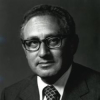Henry A. Kissinger

Henry A. Kissinger
Henry Alfred Kissingeris an American diplomat and political scientist. He served as National Security Advisor and later concurrently as United States Secretary of State in the administrations of presidents Richard Nixon and Gerald Ford. For his actions negotiating the ceasefire in Vietnam, Kissinger received the 1973 Nobel Peace Prize under controversial circumstances, with two members of the committee resigning in protest. Kissinger later sought, unsuccessfully, to return the prize. After his term, his advice has been sought by world leaders...
NationalityGerman
ProfessionStatesman
Date of Birth27 May 1923
CountryGermany
History is not, of course, a cookbook offering pretested recipes. It teaches by analogy, not by maxims. It can illuminate the consequences of actions in comparable situations, yet each generation must discover for itself what situations are in fact comparable.
Committees are consumers and sometimes sterilizers of ideas, rarely creators of them.
Taiwan will probably not declare independence. The question isn't independence. The issue is whether Taiwan will declare itself as a sovereign separate state. That will start a huge crisis if that happens.
Diplomats operate through deadlock, which is the way by which two sides can test each other's determination. Even if they have egos for it few heads of government have the time to resolve stalemates, their meetings are too short and the demands of protocol too heavy.
Becoming conscious is of course a sacrilege against nature; it is as though you had robbed the unconscious of something. The nice thing about being a celebrity is that if you bore people they think it's their fault.
Jews were segregated from 1933 on. We could only play against other Jewish teams. This wasn't just social segregation; this was the beginning of the extermination of the Jews. That's why my family left Germany in 1938.
The illegal we do immediately. The unconstitutional takes a little longer.
I don't stand on protocol. Just call me your Excellency.
A nation riven by factions, in which the minority has no hope of ever becoming a majority, or in which some group knows it is perpetually outcast, will seem oppressive to its members, whatever the legal pretensions.
When you travel as secretary, one problem you have is that the press comes with you and wants an immediate result because it justifies their trip. And sometimes the best result is that you don't try to get a result but try to get an understanding for the next time you go to them.
Where position is felt to be a birthright, generosity is possible (though not guaranteed); flexibility is not inhibited by a commitment to perpetual success.
Of course, in principle, they're against it. We are the ones that keep asking them what they think about it. I think their basic concern is a land-based missile defense of Taiwan hooked into the American communications and other systems, which in effect would make Taiwan then an outpost of the United States. That is a concern they frequently express. A missile defense shield of the United States, while they may not like it, it is not a big obstacle to our relationship.
Left to its own devices, the State Department machinery tends toward inertia rather than creativity; it is always on the verge of turning itself into an enormous cable machine.
Revolutionaries are rarely motivated primarily by material considerations-though the illusion that they are persists in the West.